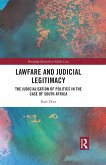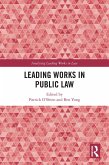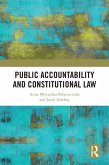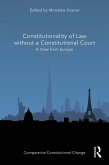Judicial Independence in Transitional Democracies (eBook, ePUB)
Redaktion: Reayat, Nauman; Cho, Moohyung; Smith, Rhona K. M.
42,95 €
42,95 €
inkl. MwSt.
Sofort per Download lieferbar

21 °P sammeln
42,95 €
Als Download kaufen

42,95 €
inkl. MwSt.
Sofort per Download lieferbar

21 °P sammeln
Jetzt verschenken
Alle Infos zum eBook verschenken
42,95 €
inkl. MwSt.
Sofort per Download lieferbar
Alle Infos zum eBook verschenken

21 °P sammeln
Judicial Independence in Transitional Democracies (eBook, ePUB)
Redaktion: Reayat, Nauman; Cho, Moohyung; Smith, Rhona K. M.
- Format: ePub
- Merkliste
- Auf die Merkliste
- Bewerten Bewerten
- Teilen
- Produkt teilen
- Produkterinnerung
- Produkterinnerung

Bitte loggen Sie sich zunächst in Ihr Kundenkonto ein oder registrieren Sie sich bei
bücher.de, um das eBook-Abo tolino select nutzen zu können.
Hier können Sie sich einloggen
Hier können Sie sich einloggen
Sie sind bereits eingeloggt. Klicken Sie auf 2. tolino select Abo, um fortzufahren.

Bitte loggen Sie sich zunächst in Ihr Kundenkonto ein oder registrieren Sie sich bei bücher.de, um das eBook-Abo tolino select nutzen zu können.
This book presents interdisciplinary and comparative analyses of judicial independence in transitional democracies across Asia, Latin America, Eastern Europe, the Middle East, and Africa. It examines factors that drive de jure and de facto judicial independence in transitional democracies and evaluates their relationship.
- Geräte: eReader
- mit Kopierschutz
- eBook Hilfe
- Größe: 1.23MB
Andere Kunden interessierten sich auch für
![Judicial Independence in Transitional Democracies (eBook, PDF) Judicial Independence in Transitional Democracies (eBook, PDF)]() Judicial Independence in Transitional Democracies (eBook, PDF)42,95 €
Judicial Independence in Transitional Democracies (eBook, PDF)42,95 €![Lawfare and Judicial Legitimacy (eBook, ePUB) Lawfare and Judicial Legitimacy (eBook, ePUB)]() Kate DentLawfare and Judicial Legitimacy (eBook, ePUB)42,95 €
Kate DentLawfare and Judicial Legitimacy (eBook, ePUB)42,95 €![Courts, Pluralism and Law in the Everyday (eBook, ePUB) Courts, Pluralism and Law in the Everyday (eBook, ePUB)]() Cinzia PiciocchiCourts, Pluralism and Law in the Everyday (eBook, ePUB)42,95 €
Cinzia PiciocchiCourts, Pluralism and Law in the Everyday (eBook, ePUB)42,95 €![Leading Works in Public Law (eBook, ePUB) Leading Works in Public Law (eBook, ePUB)]() Leading Works in Public Law (eBook, ePUB)42,95 €
Leading Works in Public Law (eBook, ePUB)42,95 €![Constitutionalism, Democracy and Religious Freedom (eBook, ePUB) Constitutionalism, Democracy and Religious Freedom (eBook, ePUB)]() Hans-Martien Ten NapelConstitutionalism, Democracy and Religious Freedom (eBook, ePUB)43,95 €
Hans-Martien Ten NapelConstitutionalism, Democracy and Religious Freedom (eBook, ePUB)43,95 €![Public Accountability and Constitutional Law (eBook, ePUB) Public Accountability and Constitutional Law (eBook, ePUB)]() Anna Mlynarska-SobaczewskaPublic Accountability and Constitutional Law (eBook, ePUB)44,95 €
Anna Mlynarska-SobaczewskaPublic Accountability and Constitutional Law (eBook, ePUB)44,95 €![Constitutionality of Law without a Constitutional Court (eBook, ePUB) Constitutionality of Law without a Constitutional Court (eBook, ePUB)]() Constitutionality of Law without a Constitutional Court (eBook, ePUB)42,95 €
Constitutionality of Law without a Constitutional Court (eBook, ePUB)42,95 €-
-
-
This book presents interdisciplinary and comparative analyses of judicial independence in transitional democracies across Asia, Latin America, Eastern Europe, the Middle East, and Africa. It examines factors that drive de jure and de facto judicial independence in transitional democracies and evaluates their relationship.
Dieser Download kann aus rechtlichen Gründen nur mit Rechnungsadresse in A, B, BG, CY, CZ, D, DK, EW, E, FIN, F, GR, HR, H, IRL, I, LT, L, LR, M, NL, PL, P, R, S, SLO, SK ausgeliefert werden.
Produktdetails
- Produktdetails
- Verlag: Taylor & Francis eBooks
- Erscheinungstermin: 31. Dezember 2024
- Englisch
- ISBN-13: 9781040276938
- Artikelnr.: 72535293
- Verlag: Taylor & Francis eBooks
- Erscheinungstermin: 31. Dezember 2024
- Englisch
- ISBN-13: 9781040276938
- Artikelnr.: 72535293
- Herstellerkennzeichnung Die Herstellerinformationen sind derzeit nicht verfügbar.
Nauman Reayat is Lecturer in Law at the School of Law, University of Leicester, United Kingdom. Previously, he was a postdoctoral fellow of the Economic Social Research Council at the School of Law and Politics, Cardiff University, United Kingdom. His research interests include comparative judicial politics, judicial independence, and the rule of law in authoritarian states and developing democracies. Rhona K.M. Smith is Professor of International Human Rights at Newcastle University, United Kingdom. From 2015-2021, she served the United Nations (UN) Human Rights Council as UN Special Rapporteur on the situation of human rights in Cambodia. Moohyung Cho is Assistant Professor in the Department of Political Science and International Relations at Ewha Womans University, South Korea. His research interests include comparative judicial politics, specifically judicial independence and the rule of law in authoritarian regimes and developing democracies.
Introduction; Part I. De Facto Judicial Independence; 1. Judicial
Independence in Hybrid Regimes: A Comparison between Bangladesh and
Pakistan; 2. Party System Institutionalization, Political Competition and
Judicial Independence in Transitional Democracies: Evidence from South
Korea and the Philippines; 3. Undermining Judicial Independence: Chief
Justices and Political Alignment in Mexico's Judicial Politics; 4. The
Weakening Judicial Independence through the Transition from the
Judicialization of Politics to the Politicisation of Judiciary: Turkish
Case; 5. Independence and Autonomy - Means towards Ends: How Misconceived
Independence Created an Isolated Judiciary in Slovakia; 6. Strengthening
De Facto Judicial Independence in Cambodia: Articulating a Human
Rights-based Approach; Part II. Theoretical and Conceptual Discussion; 7.
Judicial Independence and the Rule of Law in Developing Democracies; 8. The
Role of the Separation of Powers in Preventing Arbitrariness; Part III. De
Jure Judicial Independence; 9. The Judiciaries in Africa at Crossroads: Can
they Counter the Wave of Authoritarian Resurgence?; 10. Judicial
Independence in the Asia Pacific Region from the Perspective of Comparative
Judicial Politics; 11. Judicial Independence in Iraq: Jurisdictional
Conflicts between the Higher Judicial Council and the Federal Supreme
Court; 12. Judicial Independence in Chile, 1973-2023; 13. Constitutional
Design as an Enabler of Peace: Colombia and its Constitutional Reform of
1991; Conclusion: Challenges, Opportunities, and Recommendations for
Judicial Independence in Transitional Democracies
Independence in Hybrid Regimes: A Comparison between Bangladesh and
Pakistan; 2. Party System Institutionalization, Political Competition and
Judicial Independence in Transitional Democracies: Evidence from South
Korea and the Philippines; 3. Undermining Judicial Independence: Chief
Justices and Political Alignment in Mexico's Judicial Politics; 4. The
Weakening Judicial Independence through the Transition from the
Judicialization of Politics to the Politicisation of Judiciary: Turkish
Case; 5. Independence and Autonomy - Means towards Ends: How Misconceived
Independence Created an Isolated Judiciary in Slovakia; 6. Strengthening
De Facto Judicial Independence in Cambodia: Articulating a Human
Rights-based Approach; Part II. Theoretical and Conceptual Discussion; 7.
Judicial Independence and the Rule of Law in Developing Democracies; 8. The
Role of the Separation of Powers in Preventing Arbitrariness; Part III. De
Jure Judicial Independence; 9. The Judiciaries in Africa at Crossroads: Can
they Counter the Wave of Authoritarian Resurgence?; 10. Judicial
Independence in the Asia Pacific Region from the Perspective of Comparative
Judicial Politics; 11. Judicial Independence in Iraq: Jurisdictional
Conflicts between the Higher Judicial Council and the Federal Supreme
Court; 12. Judicial Independence in Chile, 1973-2023; 13. Constitutional
Design as an Enabler of Peace: Colombia and its Constitutional Reform of
1991; Conclusion: Challenges, Opportunities, and Recommendations for
Judicial Independence in Transitional Democracies
Introduction; Part I. De Facto Judicial Independence; 1. Judicial
Independence in Hybrid Regimes: A Comparison between Bangladesh and
Pakistan; 2. Party System Institutionalization, Political Competition and
Judicial Independence in Transitional Democracies: Evidence from South
Korea and the Philippines; 3. Undermining Judicial Independence: Chief
Justices and Political Alignment in Mexico's Judicial Politics; 4. The
Weakening Judicial Independence through the Transition from the
Judicialization of Politics to the Politicisation of Judiciary: Turkish
Case; 5. Independence and Autonomy - Means towards Ends: How Misconceived
Independence Created an Isolated Judiciary in Slovakia; 6. Strengthening
De Facto Judicial Independence in Cambodia: Articulating a Human
Rights-based Approach; Part II. Theoretical and Conceptual Discussion; 7.
Judicial Independence and the Rule of Law in Developing Democracies; 8. The
Role of the Separation of Powers in Preventing Arbitrariness; Part III. De
Jure Judicial Independence; 9. The Judiciaries in Africa at Crossroads: Can
they Counter the Wave of Authoritarian Resurgence?; 10. Judicial
Independence in the Asia Pacific Region from the Perspective of Comparative
Judicial Politics; 11. Judicial Independence in Iraq: Jurisdictional
Conflicts between the Higher Judicial Council and the Federal Supreme
Court; 12. Judicial Independence in Chile, 1973-2023; 13. Constitutional
Design as an Enabler of Peace: Colombia and its Constitutional Reform of
1991; Conclusion: Challenges, Opportunities, and Recommendations for
Judicial Independence in Transitional Democracies
Independence in Hybrid Regimes: A Comparison between Bangladesh and
Pakistan; 2. Party System Institutionalization, Political Competition and
Judicial Independence in Transitional Democracies: Evidence from South
Korea and the Philippines; 3. Undermining Judicial Independence: Chief
Justices and Political Alignment in Mexico's Judicial Politics; 4. The
Weakening Judicial Independence through the Transition from the
Judicialization of Politics to the Politicisation of Judiciary: Turkish
Case; 5. Independence and Autonomy - Means towards Ends: How Misconceived
Independence Created an Isolated Judiciary in Slovakia; 6. Strengthening
De Facto Judicial Independence in Cambodia: Articulating a Human
Rights-based Approach; Part II. Theoretical and Conceptual Discussion; 7.
Judicial Independence and the Rule of Law in Developing Democracies; 8. The
Role of the Separation of Powers in Preventing Arbitrariness; Part III. De
Jure Judicial Independence; 9. The Judiciaries in Africa at Crossroads: Can
they Counter the Wave of Authoritarian Resurgence?; 10. Judicial
Independence in the Asia Pacific Region from the Perspective of Comparative
Judicial Politics; 11. Judicial Independence in Iraq: Jurisdictional
Conflicts between the Higher Judicial Council and the Federal Supreme
Court; 12. Judicial Independence in Chile, 1973-2023; 13. Constitutional
Design as an Enabler of Peace: Colombia and its Constitutional Reform of
1991; Conclusion: Challenges, Opportunities, and Recommendations for
Judicial Independence in Transitional Democracies







